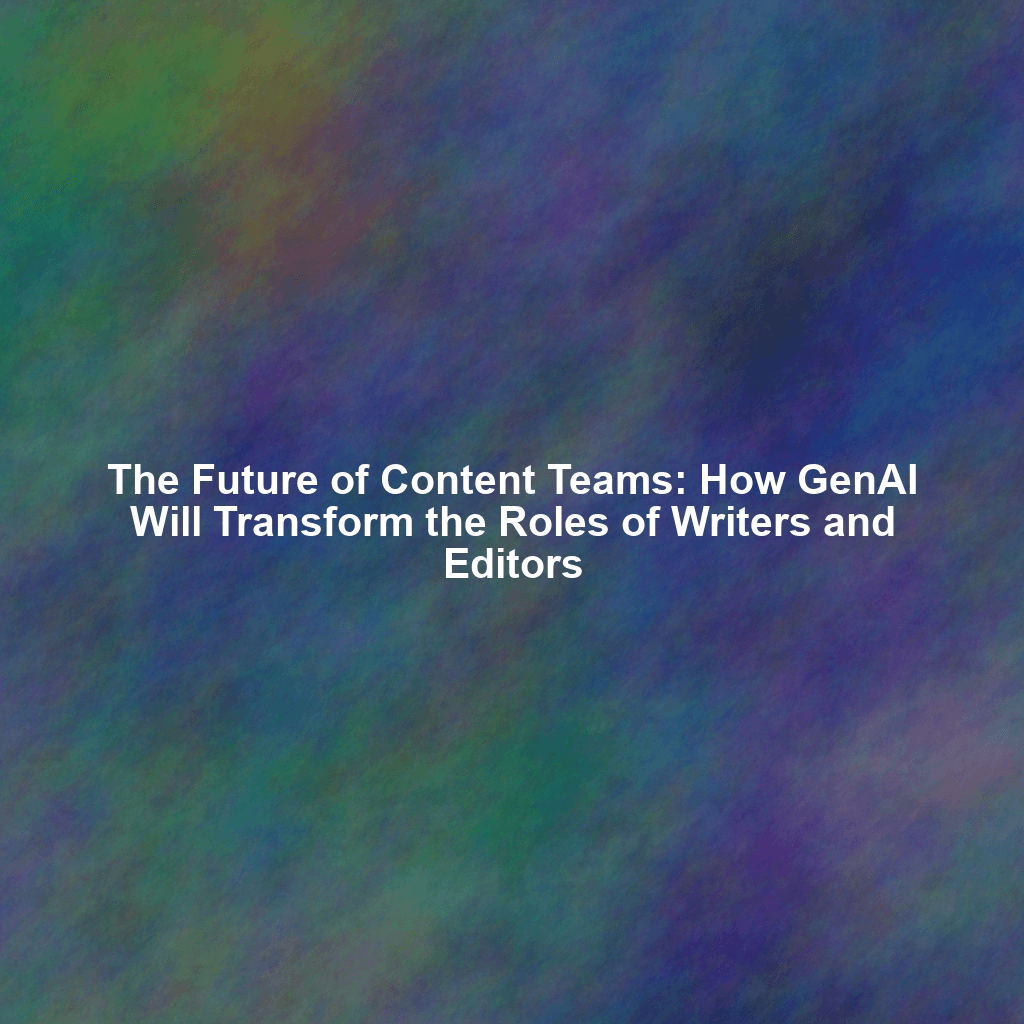The world of content creation is undergoing a seismic shift, and at the epicenter of this transformation is Generative AI (GenAI). No longer a futuristic fantasy, GenAI tools are rapidly evolving, promising to reshape the roles of content writers and editors in ways we’re only beginning to understand. This article dives deep into this evolving landscape, predicting how GenAI will impact content teams, the new skills required, and the future of content quality itself.
GenAI’s Current Capabilities: A Double-Edged Sword
GenAI excels at tasks like:
- Generating Initial Drafts: Creating outlines, writing basic articles, and even crafting social media posts.
- SEO Optimization: Identifying relevant keywords, suggesting meta descriptions, and optimizing content for search engines.
- Grammar and Style Editing: Correcting grammatical errors, improving sentence structure, and ensuring consistent style.
- Content Repurposing: Transforming long-form content into shorter formats like summaries or social media snippets.
However, GenAI isn’t perfect. Its limitations include:
- Lack of Original Thought and Creativity: GenAI primarily synthesizes existing information, struggling to generate truly innovative ideas.
- Potential for Plagiarism: AI-generated content can inadvertently plagiarize existing sources if not carefully reviewed.
- Inability to Verify Factual Accuracy: GenAI can sometimes hallucinate facts or present inaccurate information as truth. This is where human oversight is critical.
- Bias and Lack of Nuance: AI models are trained on vast datasets, which can contain biases that are reflected in the generated content. Furthermore, it often misses the subtle nuances of language and tone.
- Absence of True Understanding: GenAI can mimic understanding, but it lacks genuine comprehension and empathy, which are crucial for creating engaging and relatable content.
The Evolving Roles of Content Writers
The rise of GenAI doesn’t signal the end of the writing profession, but rather a significant evolution. Writers will need to adapt and embrace new skills:
The Writer as a Prompter and Curator
Instead of starting from scratch, writers will increasingly become “prompt engineers,” crafting precise and effective prompts to guide GenAI tools. They will also act as curators, carefully selecting and refining the best AI-generated content.
Focus on Original Research and Expertise
With GenAI handling basic content creation, writers can dedicate more time to in-depth research, interviews, and original analysis. This expertise will be crucial for creating high-quality, trustworthy content that stands out from the AI-generated noise.
Storytelling and Emotional Connection
GenAI struggles to create content that resonates emotionally with readers. Writers will need to hone their storytelling skills to craft compelling narratives that connect with audiences on a human level.
Developing a Unique Voice and Style
In a world filled with AI-generated content, having a distinctive writing style becomes more important than ever. Writers will need to cultivate a unique voice that reflects their personality and expertise, differentiating their work from the homogenous output of AI.
The Editor’s Enhanced Role: Ensuring Quality and Accuracy
Editors will play an even more critical role in the age of GenAI. Their responsibilities will expand to include:
Fact-Checking and Verification
Ensuring the accuracy of AI-generated content is paramount. Editors will need to meticulously fact-check all information and verify sources to prevent the spread of misinformation.
Detecting and Correcting Bias
Editors will be responsible for identifying and mitigating biases in AI-generated content, ensuring that it is fair, objective, and inclusive.
Maintaining Brand Voice and Consistency
Editors will ensure that AI-generated content aligns with the brand’s voice, tone, and style guidelines. This will require a deep understanding of the brand’s identity and target audience.
Optimizing for Human Readability
While GenAI can optimize for SEO, editors must ensure that the content remains engaging and readable for human audiences. This includes improving sentence structure, clarifying complex ideas, and adding a human touch.
SEO Optimization in the Age of GenAI
GenAI can significantly assist with SEO, but human oversight is still essential. Editors and writers need to understand:
Keyword Research and Integration
GenAI can identify relevant keywords, but humans need to strategically integrate them into the content in a natural and engaging way.
Content Structure and Formatting
Optimizing content for readability, including using headings, subheadings, and bullet points, is crucial for both SEO and user experience.
Link Building and Authority
GenAI can suggest potential link opportunities, but humans need to evaluate the quality and relevance of those links to build authority.
The Future is Collaborative: Human + AI
The most successful content teams will be those that embrace a collaborative approach, leveraging the strengths of both humans and AI. GenAI can handle repetitive tasks and generate initial drafts, while humans can provide creativity, expertise, and critical thinking. The key is to find the right balance and integrate AI into the workflow in a way that enhances human capabilities, not replaces them.
Conclusion
GenAI is poised to revolutionize the content creation process, transforming the roles of writers and editors. By embracing new skills, focusing on originality and expertise, and prioritizing quality and accuracy, content teams can thrive in this evolving landscape. The future of content is not about replacing humans with AI, but about empowering them to create better, more engaging, and more trustworthy content than ever before. The key will be understanding how to effectively integrate GenAI into the workflow and continuously adapt to the changing demands of the digital world.
 Skip to content
Skip to content

